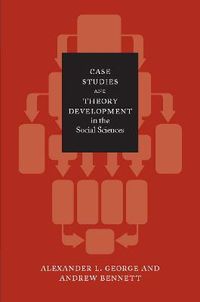
Case Studies and Theory Development in the Social SciencesBCSIA bookBCSIA studies in international securityCase Studies and Theory Development in the Social Sciences, Alexander L. George
Winner of the 2006 Giovanni Sartori Book Award, given by the American Political Science Association's Qualitative Methods Section.
The use of case studies to build and test theories in political science and the other social sciences has increased in recent years. Many scholars have argued that the social sciences rely too heavily on quantitative research and formal models and have attempted to develop and refine rigorous methods for using case studies. This text presents a comprehensive analysis of research methods using case studies and examines the place of case studies in social science methodology. It argues that case studies, statistical methods, and formal models are complementary rather than competitive. The book explains how to design case study research that will produce results useful to policymakers and emphasizes the importance of developing policy-relevant theories. It offers three major contributions to case study methodology: an emphasis on the importance of within-case analysis, a detailed discussion of process tracing, and development of the concept of typological theories. Case Studies and Theory Development in the Social Sciences will be particularly useful to graduate students and scholars in social science methodology and the philosophy of science, as well as to those designing new research projects, and will contribute greatly to the broader debate about scientific methods.
Utgiven: 2005
ISBN: 9780262072571
Förlag: MIT Press
Språk: Engelska
Sidor: 331 st
Winner of the 2006 Giovanni Sartori Book Award, given by the American Political Science Association's Qualitative Methods Section.
The use of case studies to build and test theories in political science and the other social sciences has increased in recent years. Many scholars have argued that the social sciences rely too heavily on quantitative research and formal models and have attempted to develop and refine rigorous methods for using case studies. This text presents a comprehensive analysis of research methods using case studies and examines the place of case studies in social science methodology. It argues that case studies, statistical methods, and formal models are complementary rather than competitive. The book explains how to design case study research that will produce results useful to policymakers and emphasizes the importance of developing policy-relevant theories. It offers three major contributions to case study methodology: an emphasis on the importance of within-case analysis, a detailed discussion of process tracing, and development of the concept of typological theories. Case Studies and Theory Development in the Social Sciences will be particularly useful to graduate students and scholars in social science methodology and the philosophy of science, as well as to those designing new research projects, and will contribute greatly to the broader debate about scientific methods.
Begagnad bok (0 st)
Varje vecka tillkommer tusentals nya säljare. Bevaka boken så får du meddelande när den finns tillgänglig igen.



